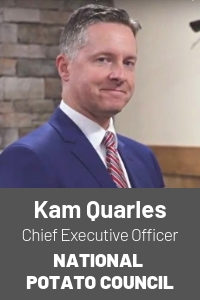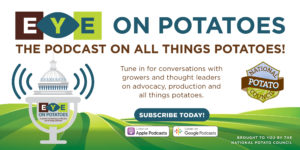Column: Moving agriculture transportation into 21st century
As we move through the first quarter of 2020, NPC and our Potato D.C. Fly-In (Feb. 24-27) attendees are taking our priority issues up to Capitol Hill with the goal of creating a better working environment for our industry members. One topic taking center stage is our support for regulations and policies that move ag transport into the 21st century.
 Unfortunately, like many industries, the U.S. transportation sector operates under a set of rules that are sometimes decades old and do not reflect modern realities. For example, as Congress writes a new Highway Bill this session, we’re reminded the bill’s funding mechanism is based on a gas tax that hasn’t been modified in roughly 20 years. However, much has changed in the last 20 years in terms of vehicle usage of our highways. With electric and hybrid vehicles now commonplace, shouldn’t the Highway Bill’s funding stream evolve to include all vehicles that use our nation’s roads and highways, not just gas- and diesel-powered vehicles? NPC and our partners believe it should and we are urging Congress to consider funding streams that better reflect today’s reality.
Unfortunately, like many industries, the U.S. transportation sector operates under a set of rules that are sometimes decades old and do not reflect modern realities. For example, as Congress writes a new Highway Bill this session, we’re reminded the bill’s funding mechanism is based on a gas tax that hasn’t been modified in roughly 20 years. However, much has changed in the last 20 years in terms of vehicle usage of our highways. With electric and hybrid vehicles now commonplace, shouldn’t the Highway Bill’s funding stream evolve to include all vehicles that use our nation’s roads and highways, not just gas- and diesel-powered vehicles? NPC and our partners believe it should and we are urging Congress to consider funding streams that better reflect today’s reality.
Changes to how we fund the Highway Bill could also lead to additional improvements to our nation’s aging bridges and roadways. As it impacts the ag transportation sector, highways and bridges that support heavier vehicles could lead to larger trucks that more efficiently haul perishable goods away from farms and packing sheds and to their customers. The industry’s support of increased truck weights is well known. Larger trucks with more axles would be safer, reduce the overall number of trucks on our roads and highways and allow for faster delivery.
Another policy priority for the Fly-In and beyond is the industry’s support for a permanent Hours of Service (HOS) exemption for ag transporters.
Since the new HOS record-keeping rules were implemented, the challenges of the ag transport sector have only grown more acute. Trucking shortages due to weather related events, challenges getting new drivers to come into the system, and overall capacity issues have all focused a spotlight on HOS rules and some their offshoot issues, including a new mandate that HOS logs are kept through Electronic Logging Device (ELDs), which are somewhat like the black box found in airplanes.
That focus on HOS as it pertains to agriculture has led some to question whether or not the flexibilities within that rule are modern and reflect today’s marketplace. Anyone hauling livestock or perishable ag products knows all too well that unnecessarily delaying those shipments can have a huge impact on the quality of the product. The reality is that shipments of potatoes or livestock should be treated differently than shipments of T-shirts or books.
At times, HOS rules recognize the unique nature of agriculture by including exemptions for truckers picking up certain types of agricultural commodities at the first point of loading — farms or packing sheds. Yet, the rules include no exemptions for those same truckers when they arrive at a crowded port facility, where they might move a few feet every hour waiting in line to be unloaded. This inconsistency raises questions of whether complementary HOS exemption should be placed on that point of unloading.
Additional HOS exemptions, changes to the gas tax and increased truck weight regulations are all pieces to the puzzle and highlight the need for laws and regulations to better conform with reality. We’re focusing D.C.’s attention on the need to create flexibilities that better meet to the unique needs of agriculture. And we’re making progress.
This year, the U.S. Department of Transportation (DOT) is considering making regulatory modifications for HOS. In addition, Congress is considering a variety of improvement bills, including House Agriculture Committee Chair Colin Peterson’s proposal to provide HOS exemptions for smaller operators and other certain types of operators.
 Through the collective efforts of NPC, our state and transportation partners and grower-advocates, decision-makers in Washington are starting to understand that HOS and other ag transport rules aren’t reflective of today’s marketplace. We’re encouraged by the progress we’ve made but know we have a long way to go.
Through the collective efforts of NPC, our state and transportation partners and grower-advocates, decision-makers in Washington are starting to understand that HOS and other ag transport rules aren’t reflective of today’s marketplace. We’re encouraged by the progress we’ve made but know we have a long way to go.
For more insight into these efforts, subscribe to NPC’s new “Eye on Potatoes” podcast — available on Apple Podcasts, Spotify, Google Podcasts or wherever you listen.
In episode #4, Ag Transportation in the 21st century, we feature discussions with Jon Sampson from the American Trucking Association and Dominic LaJoie, majority owner and partner of LaJoie Growers Vegetable Operations in Aroostook County, Maine, who talk about the need to address the transportation challenges faced by the potato supply chain.







